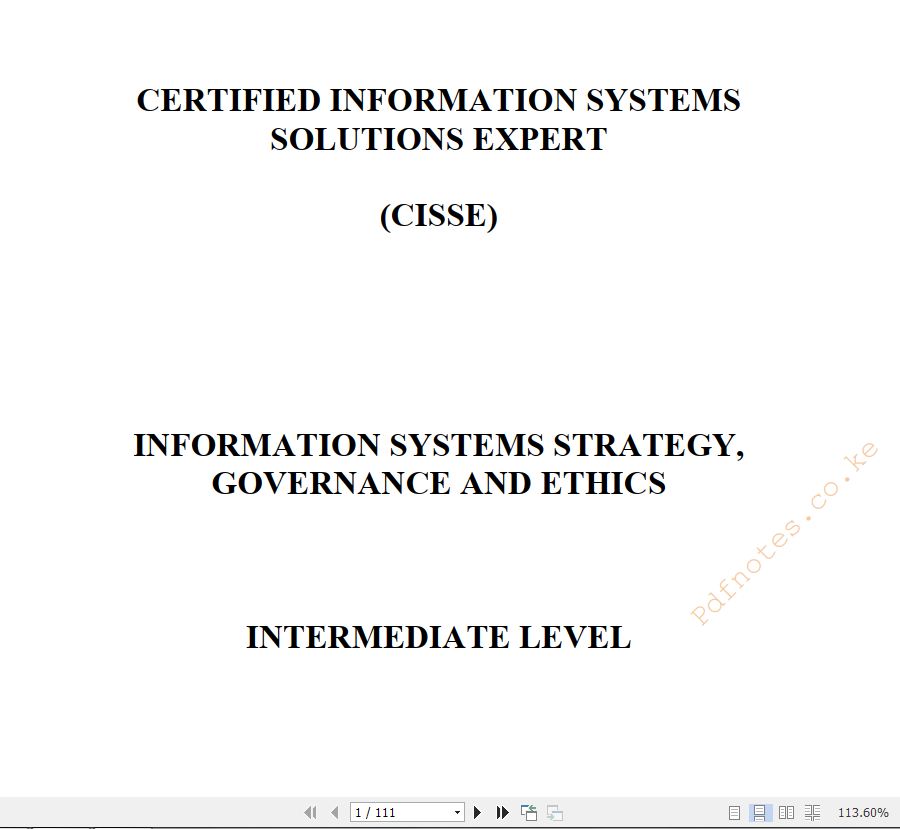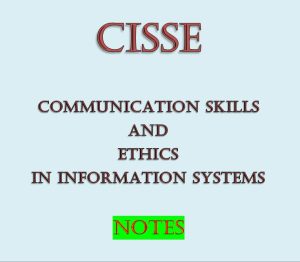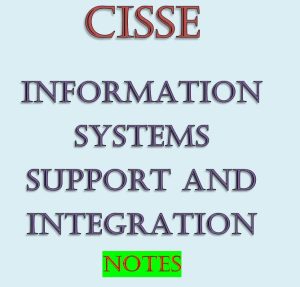Original price was: KSh900.KSh799Current price is: KSh799.
TOPICS COVERED
Chapter 1: Introduction
Chapter 2: Corporate Level IS Strategy
Chapter 3: Information Systems Strategy Triangle
Chapter 4: Organizational Strategy and Information Systems
Chapter 5: Information Systems and Governance
Chapter 6: Information Systems Risk Management
Chapter 7: Managing Innovations
Chapter 8: Ethics in Information Systems
Chapter 9: Selected Industry Practices and Case Studies
Chapter 10: Emerging Issues in IS Strategy, Governance and Ethics
Description
INFORMATION SYSTEMS STRATEGY, GOVERNANCE AND ETHICS
UNIT DESCRIPTION
This paper is intended to equip the candidate with the knowledge, skills and attitude that will
enable him/her formulate effective strategies in the context of organisational information systems while complying with governance and ethical requirements.
LEARNING OUTCOMES
A candidate who passes this paper should be able to:
• Demonstrate understanding of how information systems (IS) can be leveraged to meet organizational strategic goals.
• Apply the knowledge of governance and ethical requirements as they relate to information systems.
• Apply information systems strategy with overall organisational strategy.
• Analyse the key strategic trends in information systems management.
• Evaluate best practices and standards in information systems governance.
• Apply key elements and principles of information systems governance in an organizational context.
CONTENT
1. Introduction
1.1 Introduction to the concepts#8211; system, strategy, governance and ethics
1.2 The role of management in strategy, governance and ethics
1.3 Information Systems and the role of IS Manager
1.4 Aligning IS Strategy with business strategy
2. Corporate Level IS Strategy
2.1 Framework
2.2 Objectives
2.3 Strategies
3. Information Systems Strategy Triangle
3.3 Business strategy
3.4 Organizational strategy
3.5 Information strategy
4. Organizational Strategy and Information Systems
4.1 Information systems and business processes
4.2 Business value of information Systems
4.3 Planning technology investment
4.4 Assessing information systems productivity
5. Information Systems and Governance
5.1 Information technology governance
5.2 Pillars of IT governance
5.3 IT governance frameworks and models
5.4 IS and Project Management
6. IS Risk Management
6.1 Application of risk management practices to information systems
6.2 Assessing information risks and controls
6.3 Data security strategies
6.4 Securing digital assets
6.5 IT security policies
6.6 Social engineering
7. Managing Innovations
7.1 Technological innovation and business strategy
7.2 Managing disruptive innovations and technological transitions
7.3 The Technology S‐curve and its implications on IS strategies
8. Ethics in Information Systems
8.1 Information systems ethics their role
8.2 Intellectual property protections
8.3 Data Privacy and Ethics
9. Selected Industry Practices and Case Studies
9.1 Adobe: Royal Bank of Scotland.
9.2 BrightEdge: Stanley.
9.3 LeadGnome: Host Analytics.
9.4 Bitly: Vissla.
9.5 Taboola: The Line.
9.6 OutBrain: Lane Bryant.
9.7 Google Analytics: Optimizely.
10. Emerging Issues in IS Strategy, Governance and Ethics
10.1 AI/Artificial intelligence holds significant potential for businesses
10.2 Blockchain
10.3 Cybersecurity as Critical Business Function.#8230;
10.4 Drones
10.5 Edge Computing.#8230;
10.6 IoT
10.7 Quantum Computing
10.8 Virtual Reality/Augmented Reality.



